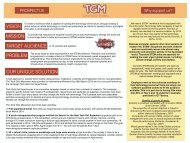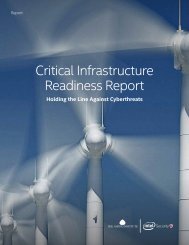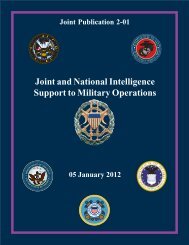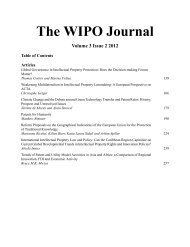Transparency Initiative (EITI)
2eoch1l
2eoch1l
You also want an ePaper? Increase the reach of your titles
YUMPU automatically turns print PDFs into web optimized ePapers that Google loves.
38 Generic Results Model<br />
39<br />
Levels Areas Variables (applicable in macro data) Indicators Conditions<br />
(conducive/obstructive)<br />
Highly<br />
aggregated<br />
impact<br />
Sustainable development<br />
Dimensions:<br />
• Economic<br />
• Social<br />
• Environmental<br />
• Governance<br />
Independent:<br />
1. GDP p.c. growth in percent<br />
2. Total population<br />
3. Country Risk Classification<br />
4. Inflation rate<br />
5. Industry value added (in local currecy<br />
units)<br />
6. Merchandized trade<br />
7. Total labor force<br />
8. Interest rate<br />
9. Corruption perception<br />
10. Received ODA<br />
Independent (not applied in the quantitative<br />
model because of data limitations,<br />
for example):<br />
1. Gini coefficient<br />
2. Export and Import<br />
4. Genuine Progress Indicator (GPI)<br />
1. Situation of target group is improved<br />
by x% (in the dimensions of<br />
economic, social, environmental<br />
and governance)<br />
Source: Sustainability indices and<br />
reporting systems to identify relationships,<br />
distributions, comparison<br />
of average values, detection of<br />
patterns, e.g. Human Development<br />
Index (HDI); Bertelsmann Transformation<br />
Index (BTI); Resource<br />
Governance Index, Global Reporting<br />
<strong>Initiative</strong> (GRI).<br />
2. X% increase of perceived responsiveness<br />
of government to stakeholders’<br />
interests<br />
Source: own survey<br />
1. Peace/conflict<br />
2. Political will<br />
3. Democratic/autocratic system<br />
4. Enforcement capacities laws and<br />
regulations<br />
5. Quality of investors<br />
Impact Conditions are improved under which extractive industries better contribute to the development<br />
In addition to the above:<br />
of producing countries.<br />
Possible aspects:<br />
1. X% of people in the target group<br />
express a positive opinion about<br />
1.<br />
2.<br />
Leadership for good governance<br />
Open dialog<br />
<strong>EITI</strong> achieving impacts<br />
Source: own survey<br />
3.<br />
4.<br />
Accountability/responsibility<br />
Improved living and human rights conditions<br />
2. X policies and procedures changed<br />
(systemic milestones achieved)<br />
4.<br />
6.<br />
Increased citizen participation in decision making and conflict mitigation<br />
Contractual problems regarding taxes, etc. are tackled<br />
3. X% increase of pro-stakeholder<br />
budget decided and allocated<br />
7. Extractive companies pay compensation for damages<br />
4. X services accessible and delivered<br />
to stakeholders (male/female)<br />
Outcome Fiscal transparency<br />
Public debate<br />
Anti-corruption Trade and investment Dependent:<br />
1. X meetings (hearings, etc.)<br />
Possible aspects:<br />
Possible aspects: Possible aspects: climate<br />
1. Business extent of disclosure<br />
between stakeholders and<br />
1. Freedom of information/ 1. Freedom of information/figures<br />
and extortion and 1. Ease of doing 3. Foreign direct investments<br />
decision makers<br />
1. Corruption, Possible aspects: 2. Discrepancy in expenditure<br />
government policy and<br />
figures and information<br />
accessible<br />
information accessible<br />
2. UN Convention 2. Costs of financing 5. Business regulatory environment<br />
media by journalists on the <strong>EITI</strong><br />
bribery tackled<br />
business<br />
4. Time to prepare and pay taxes<br />
2. X% increase of reporting in the<br />
2. Quality assurance in government<br />
(Change processes) 2. Public understanding<br />
of government (UN-CAC) imple-<br />
3. Volume of<br />
7. Fiscal policy<br />
compared to the previous year<br />
Against Corruption projects<br />
6. Equity of public resource use rating and the extractive industries<br />
revenues and expenditure<br />
increased<br />
4. Quality of<br />
9. Trade<br />
enues reconciled compared to the<br />
mented<br />
investments<br />
8. Quality of public administration 3. X increased total percentage of rev-<br />
investments<br />
10. <strong>Transparency</strong>, accountability and<br />
previous year<br />
corruption<br />
4. Change of x ranks in the ‘Ease of<br />
doing business’ (or other surveys).<br />
(for variables in full details, see dataset in<br />
5. USD X million higher volume or<br />
study)<br />
higher quality investments<br />
Dependent (not applied in the quantitative<br />
model because of data limitations, for example):<br />
6. X% of stakeholders show change<br />
of perceptions of <strong>EITI</strong>-induced<br />
changes<br />
1. Bribery incidence<br />
2. Informal payments to public officials<br />
3. Tax revenues<br />
Output Stakeholders have greater capacity (in terms of expertise and means) to participate in informed and consensual<br />
1. <strong>EITI</strong> Reports published in a timely<br />
decision making for public or corporate policy.<br />
manner (yes/no)<br />
Key <strong>EITI</strong> outputs:<br />
2. Level of knowledge of sector policy<br />
and budget issues<br />
1. <strong>EITI</strong> Reports, produced annually and available on national <strong>EITI</strong> websites and on eiti.org.<br />
3. Level of awareness of rights of<br />
2. <strong>EITI</strong> Annual Activity Reports, which track progress against <strong>EITI</strong> Requirements, objectives and progress in<br />
stakeholders and roles of<br />
following the recommendations of <strong>EITI</strong> Reports.<br />
duty-bearers<br />
3. <strong>EITI</strong> Validation Reports, evaluating country implementation against the <strong>EITI</strong> Standard.<br />
4. Level of skills for sustainable financial<br />
management<br />
4. <strong>EITI</strong> Secretariat Reviews, produced occasionally as interim assessments pending Validation.<br />
5. Level and quality of participation<br />
in stakeholder groups<br />
6. Level and quality of interaction between<br />
stakeholder groups<br />
7. Level and quality of information<br />
available for M&E<br />
Activities/<br />
Processes<br />
Inputs<br />
1. MSG established<br />
2. Key stakeholders capacitated<br />
3. EI framework conditions monitored<br />
4. Payments reported, reconciliated and disclosed<br />
5. EI decision chain information disclosed (e.g. on licensing)<br />
6. Reform processes of the state and for businesses identified, facilitated and driven by the <strong>EITI</strong>)<br />
1. Decisions by the International <strong>EITI</strong> Board to develop, adjust and enforce the Standard<br />
2. Political will, services (e.g. preparing data) and financing (e.g. staff) provided by implementing<br />
governments, and key stakeholders (e.g. in MSG)<br />
3. Services by the International <strong>EITI</strong> Secretariat (e.g. advice, training, facilitation, research)<br />
4. Services and financing by supporting governments, companies, NGOs, foundations, philanthropists, etc.<br />
(e.g. advice, training, facilitation, research)<br />
5. Research results from academia<br />
1. <strong>EITI</strong> training plan for MSG members,<br />
Secretariat staff, and stakeholders<br />
adopted and implemented<br />
(yes/no)<br />
2. Follow up action plans and strategies<br />
to address <strong>EITI</strong> reports recommendations<br />
are developed and<br />
agreed by MSG annually (yes/no)<br />
3. X persons trained who confirm a<br />
knowledge and competency gain<br />
through the training measure<br />
4. X sensitization (awareness building)<br />
events conducted<br />
5. X persons sensitized<br />
6. X% scored<br />
1. Political will<br />
2. Legal regime<br />
3. Relation of media as party with government<br />
or companies<br />
4. (EI) Literacy<br />
5. Quality of investors<br />
1. Financing<br />
2. Expertise<br />
3. Relevance of stakeholders<br />
4. Accessibility and comprehensiveness<br />
of report<br />
5. Insecurity (conflict & crime)<br />
6. Legal restrictions









